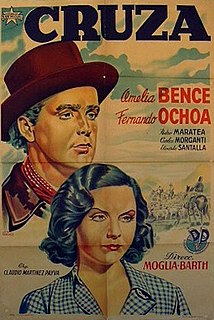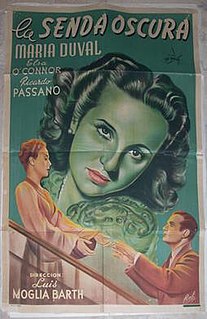Francisco Audenino | |
|---|---|
 Audenino in 1953 | |
| Died | 1964 |
| Occupation | Actor |
| Years active | 1935–1961 (film) |
Francisco Audenino (died 1964) was an Argentine film actor who appeared in around fifty productions, generally in supporting roles. [1]
Francisco Audenino | |
|---|---|
 Audenino in 1953 | |
| Died | 1964 |
| Occupation | Actor |
| Years active | 1935–1961 (film) |
Francisco Audenino (died 1964) was an Argentine film actor who appeared in around fifty productions, generally in supporting roles. [1]

Buenos Aires a la vista is a 1950 Argentine musical drama film directed and written by Luis Bayón Herrera with Carlos A. Petit. The tango film premiered on September 20, 1950 in Buenos Aires.

Arriba el telón o el patio de la morocha is a 1951 Argentine musical drama film directed by Manuel Romero and written by Cátulo Castillo and Mariano Mores.The film premiered in early 1951 in Buenos Aires. The film starred Virginia Luque.

Avivato is a 1949 Argentine film directed and written by Enrique Cahen Salaberry with Ariel Cortazzo. Starring Pepe Iglesias.
Our Land of Peace is a 1939 Argentine-Spanish biographical film directed by Arturo S. Mom. The film premiered in Buenos Aires and starred Warly Ceriani.

Cruza is a 1942 Argentine film directed by Luis Moglia Barth.
Vacations is a 1947 Argentine film.
Dance of Fire is a 1949 Argentine drama film directed by Daniel Tinayre. It was entered into the 1951 Cannes Film Festival.

Pasó en mi barrio is a 1951 Argentine film directed by Mario Soffici. It was entered into the 1952 Cannes Film Festival.
Ellos nos hicieron así is a 1952 Argentine film directed by Mario Soffici.
The Count of Monte Cristo is a 1953 Argentine-Mexican historical adventure film directed by León Klimovsky and starring Jorge Mistral, Elina Colomer and Santiago Gómez Cou. It is an adaptation of Alexandre Dumas's 1844 novel The Count of Monte Cristo.
Después del silencio is a 1956 Argentinian movie filmed in black and white directed by Lucas Demare on the script by Sixto Pondal Ríos whose main characters were Arturo García Buhr, María Rosa Gallo, Guillermo Battaglia and Mario Passano, which premiered on 13 September, 1956. It is a film classified as a pamphleteer that while filming was called Aurora of freedom. It was the last film in which Gloria Bayardo intervened.
Una viuda difícil is a 1957 Argentine comedy film directed by Fernando Ayala and written by Conrado Nalé Roxlo, based on his homonymous theatre play. It stars Alba Arnova, Alfredo Alcón and Ricardo Castro Ríos. Music was composed by Ástor Piazzolla and Vassili Lambrinos created the choreography for the black and white film.
La venenosa is an Argentine drama film released in 1958 starring Ana Luisa Peluffo as a circus trapeze artist who brings bad luck to those who fall in love with her.
Father Marià Paieres i Borràs (Catalan), commonly known as Mariano Payeras Borrás or Padre Mariano Payeras was a Spanish missionary to the Americas.

La senda oscura is a 1947 Argentine film, directed by Luis Moglia Barth and starring María Duval, Elsa O'Connor and Ricardo Passano.
The Drummer of Tacuari is a 1948 Argentine historical drama film, directed by Carlos F. Borcosque and written by Hugo Mac Dougall. It was premiered on July 6, 1948.

Un centavo de mujer is a 1958 Argentine romantic drama film directed by Román Viñoly Barreto. It stars Georges Rivière, Elsa Daniel and Nelly Panizza. The film is about a teenage girl who has the desire to pursue a relationship with an older, drunken French actor.
Valentina is a 1950 Argentine comedy film directed by Manuel Romero and starring Olga Zubarry, Juan José Miguez and Elena Lucena. The film's sets were designed by Ricardo J. Conord.
Behind a Long Wall is a 1958 Argentine drama film directed by Lucas Demare and starring Susana Campos, Gloria Ferrandiz and Ricardo Argemí. A rural family emigrate to Buenos Aires but are disillusioned with life in the city's poor suburbs.
There's a Road on the Right is a 1953 Spanish drama film directed by Francisco Rovira Beleta and starring Francisco Rabal, Julia Martínez and Carlos Otero.